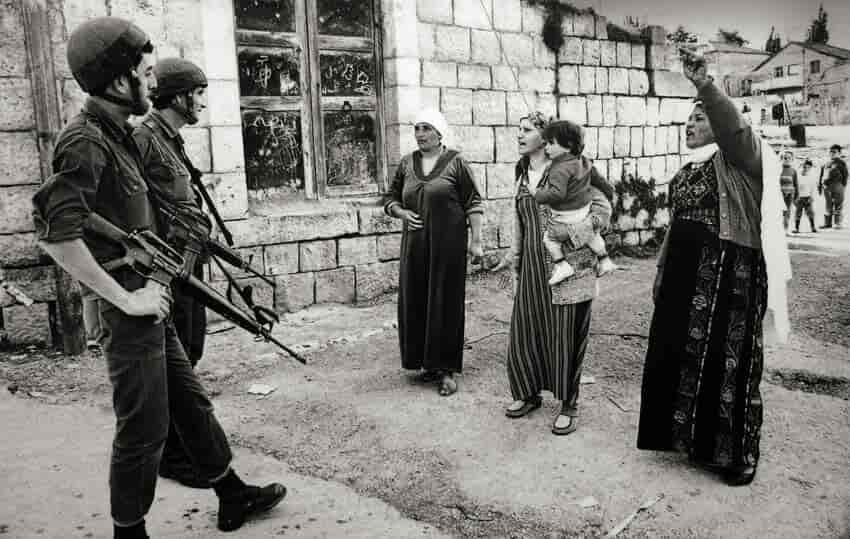Religion has proven to be a part of a restructuring world order, and simply ignoring it or brushing it aside won’t do. The methodological atheism baked into scholarly understandings of the inter-state world order will, in any case, have to be revisited.
The conflict in Gaza is highly polarizing and of, course, dominated by short-term, emotional concerns of life, death, and land. As such, it is difficult to rationally track the longer-term implications emerging from the way in which the war is being fought, which I would argue is a fundamental task for social scientists.
I outline four such implications that social scientists may, at some point, bring to the front-burner in order to make sense of how the world is changing as a result of this war. While many more may and should be listed, these four focus on the inescapable role of religion in understanding modern society. Naturally, this is not the only world “event” in the works, nor is a triumphalist position required as to the significance of this moment in the never-ending tectonic shifts in global political and social change. Yet, the sheer numbers and global spread involved in the war in Gaza make it an event whose ramifications are worth tracking for future research.
Religion in inter-state relations: The US-Israel exception
The first ramification is the American-Israeli inter-state relation. The USA is not an exceptional country, despite national political rhetoric to the contrary. Recent research, including at Tampere University, has compared this rhetoric to that in other countries and found that similar “exceptionalism” dominates most nationalist sentiments, even those which are not extreme. A claim to exceptionalism among the community of nations turns out to be an irreducible aspect of nation-building and, as such, is performed routinely, banally, and ritualistically.
What the ongoing war shows is that the discursive relationship between these two nation-states is, indeed, exceptional in that no parallel can be found in the modern world. A relational view might argue that all of the world is a system of relations, yet that ontologically flattens all relations: there is something more at stake here than in other inter-state relations. It’s not “only” a relation in talk (such as between US and UK parliaments or statesmen as to their “special relationship”). Rather, it trumps competing demands with unequalled alacrity. That is, mention of this relation is enough to overcome national sovereign interests or even democratic procedures in either country, which defines a true state of exceptionality. For instance, the White House continued to arm Israel knowing the weapons will be used in a war effort that the American President is not allowed to enable without specific approval of the Congress. The relation may be juxtaposed with other world-defining political relations, such as the unwavering, constitutive-Othering of Russia and China in the Western European and American political imagination. Are these relations equally formative of the world order and how resources, ideas, and people flow between societies? Do they matter equally in how national societies acquire and distribute wealth, or define their internal structures? These are all matters for future theoretical and empirical investigation.
Mention of this relation is enough to overcome national sovereign interests or even democratic procedures in either country, which defines a true state of exceptionality. For instance, the White House continued to arm Israel knowing the weapons will be used in a war effort that the American President is not allowed to enable without specific approval of the Congress.
One significant difference in the Amerian-Israeli discursive relationship is the ever-present, often-explicit, religious tone. Neither USA nor Israel are unique in the theological foundations of origin stories or “exceptionalism.” For instance, Saudi Arabia, Iran, Pakistan, and Armenia are just a few examples of countries with explicitly theological origins, while established relations between state and religion continue in other countries like in UK and Finland). So, despite the secular character of most polities, there is a complicated and often-unexamined relationship between religion and statehood, similar to religio-political discourse in the USA being a “city on the hill” or evangelicism woven into that country’s politics. However, the theological bond between USA and Israel is exceptional, and yet more because it is inter-religious (Christianity-Judaism). It would be near-impossible to find such an example in the modern world, at least between state polities. So, the USA-Israel inter-state discursive bond must be investigated as an exceptional theological relation in the world system. Much remains to be unpacked about this.
Past the rules-based international order
The second issue for further research, well recognized now in International Relations or global sociology, is the collapse of the post-World War II rules-based international order relying on consensus decision-making.
Some point to growing claims of “unprecedented” circumstances to circumvent rules. Others have argued that this rules-based international order fell in the aftermath of 9/11 with the United States forcefully leading a coalition to a War on Terror. In any case, the rules-based order has now been shown to have fallen to an undeniable extent. The treatment of and abolition of funding for UNRWA, agitated but ignored statements of the UN Secretary-General, violation of exceptional regulations, permanent vetoes in the Security Council, negotiations with explicitly labelled terrorists, and a materially irrelevant International Court of Justice are just some examples. To which must be added the shadowy operation of individuals in and around US or UK foreign ministries as well as mega-corporations.
Scholarship will now need to move beyond describing the fall of a rules-based world order and take into account the fact that this fall has been widely televised and recognized.
Scholarship will now need to move beyond describing the fall of a rules-based world order and take into account the fact that this fall has been widely televised and recognized. If the rules-based order structured state and individual (inter)actions, the recognition of its fall is an event that will have restructuring consequences. Statesmen, parliaments, courts, and other institutions around the world will doubtless align their actions accordingly, in ways that must be mapped. Normative theory might try to find pathways back to a utopian order based on revised rules. Or, the implications of multipolar solutions, such as those emerging out of the UK and USA might need to be investigated further. In any case, revised structures are being or already have sedimented.
Among other things, religion has proven to be a part of a restructuring world order, and simply ignoring it or brushing it aside won’t do. The methodological atheism baked into scholarly understandings of the inter-state world order will, in any case, have to be revisited. That is, most social scientific accounts of inter-state relations can no longer approach their object of study as if religion were simply an add-on to more “fundamental” explanations; rather, they will have to start with integrate religion into their analyses.
Imagined Ummah
The third ramification is about so-called “political Islam.” This has turned out to be an empty term, at least in the way it has been popularly used. Muslim-majority states have stood entirely to the side of the war in material terms, minor rules-based motions and speeches notwithstanding. Some relief has trickled in from Muslim populations to the Egyptian border with Palestine, and Muslim non-state actors (e.g., Houthis or Hizbollah) have timidly toed into the war and faced consequences.
But this is, in the larger scheme of the war, insignificant. Even in the arguably-catastrophic circumstance of a US-led attack on Iran, it is more likely that support for the latter will come from the Russian state and non-state Islamic actors rather than from Muslim-majority states. Some scholars refer to a distinction between Arab street and state in Muslim responses to geopolitical events. That may be true but is difficult to empirically prove, and anyway requires a blanket assumption that all Muslim states are authoritarian and unresponsive to their Muslim populations, which is untenable.
’Asabiyyah is the term coined by medieval Muslim historiographer and founder of sociology, Ibn Khaldun, to denote a lien social, a sort of bond, holding Muslims together. Many scholars read this as the basis of the ummah, qua political nation of Islam. Yet, this war has shown what ’asabiyyah consists of and what it doesn’t, putting paid also to the idea of a politically mobilized global ummah. As many researchers have pointed out, the umma is obviously an imagined concept: after all, we can’t point to it or invite it’s representative. But what is important is to map how that has been imagined and what that imagining does or doesn’t lead to. States remain crucial in international affairs, but Islam in particular and religion in general have more complicated involvements that we don’t often study due to theoretical blinkers.
States remain crucial in international affairs, but Islam in particular and religion in general have more complicated involvements that we don’t often study due to theoretical blinkers.
The consequences of the war in Gaza for understanding umma and pan-Islamic ’asabiyyah must be studied in greater detail. Not only geopolitically but also regarding what may be termed the “form of life” of a Muslim. Indeed, the ummah was traditionally far more a theological concept than a sociological or political one. It indicated a space or mode of piety and it is worth exploring whether that traditional form of identification still holds more weight in the Muslim imagination than global political mobilization through states. Then, the notion of a global Jewry is similarly constructed, but is different in notable yet little understood ways, for instance its geocentricity, historical lineage, etc. It, too, has implications for the “form of life” of a modern Jew and her practice. To what extent these social bonds weave together theological affiliation with social or political action, all needs to be investigated, compared, and theorized.
Land re-placed
Finally, fourth, for those political sociologists and philosophers who had moved past the “outmoded” issues of land and place into theories of structures and space, the war in Gaza is a harsh throwback to the “real.” Land was never “just” soil. Land and place retain mobilizing ability that abstract socio-political bonds and disembodied notions of space can only aspire to (as for the Ayodhya temple in India). Moreover, Re’im and Gaza show that this reality cannot be reduced to media images or the shifting meaning-constructs appended to land and place. The ontological reality of land cannot be reduced to the relative epistemology of how to understand land or what it might “mean:” land and place can be understood or reduced in more ways than one. This is the multi-modal challenge of materiality. While mediation is a recognized phenomenon, materiality has rarely found a foothold in international political or even sociological thought and remains a challenge for social scientists in the backdrop of Gaza. That is, land is more than an empty placeholder on which meaning is adduced: land is an inherent (that is, internally related) aspect of social structures that, in turn, enable meaningful action.
In other words, land and place are symbolic beyond mere conceptual signification. Furthermore, the practical and irreducible symbolism of land and place is thoroughly embedded in a religious register, but how and with what implications or variations remains to be studied and theorized.
The war on Gaza demands scholars to refine their analyses and infuse them with seriousness, that is align their study to the touchstone of reality. It’s not too early do that.
Again, these are just four issues pertaining to the scientific understanding of religion and society in the face of the Gaza war. More instance of understanding religion in society can and should be enumerated, including in other domains. Obviously, such issues will only emerge for study as and when scholars move past immediate challenges, polarized rhetoric, and other ideological pressures not to think. But the war on Gaza demands scholars to refine their analyses and infuse them with seriousness, that is align their study to the touchstone of reality. It’s not too early do that.



